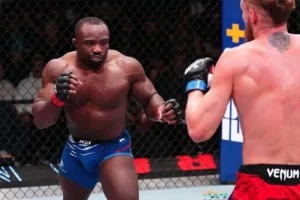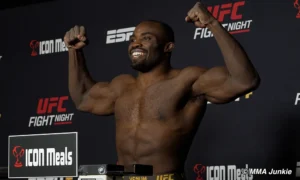
Torrez Finney Edges Out Robert Valentin in Controversial Split Decision at UFC Fight Night
The UFC Apex bore witness to a polarizing middleweight clash on Saturday night as Torrez “The Punisher” Finney made his long-awaited promotional debut against “TUF 32” runner-up Robert “Robzilla” Valentin in the main card opener of UFC Fight Night: Emmett vs. Murphy (UFC Vegas 105). What unfolded over 15 minutes was a grueling, wrestle-heavy affair that left fans, fighters, and analysts divided, culminating in a split decision victory for Finney that sparked heated debate about scoring criteria in modern MMA.
Finney, an undefeated 26-year-old from Macon, Georgia, entered the octagon with a 10-0 record, forged through a unique journey that included three appearances on Dana White’s Contender Series (DWCS). Standing at 5’8” with a stocky, muscular frame, Finney brought a decorated wrestling background—highlighted by two Georgia state championships—and a reputation for overwhelming physicality. Across from him stood Valentin, a 30-year-old Swiss striker with a 10-4 record, fresh off a rollercoaster run on The Ultimate Fighter Season 32, where he notched viral knockouts but fell short in the finale to Ryan Loder via TKO. The 6’2” Valentin, armed with a Muay Thai pedigree and a 77-inch reach, aimed to rebound from his UFC debut loss and spoil Finney’s first dance under the big lights.
The fight, broadcast live on ESPN and ESPN+, kicked off the main card at approximately 9:15 p.m. ET, setting the tone for a night headlined by Josh Emmett vs. Lerone Murphy. For Finney, it was a chance to prove he belonged after years of grinding for UFC recognition. For Valentin, it was an opportunity to showcase the striking flair that had captivated fans on TUF and secure his first UFC win. What transpired, however, was a battle that tested the boundaries of entertainment, effectiveness, and the sport’s judging system.
 Round-by-Round Breakdown
Round-by-Round Breakdown
**Round 1:** The opening frame saw Valentin take the center, flicking out a front kick to the body to gauge distance. Finney, undeterred, wasted no time closing the gap, driving forward with a low stance that belied his compact build. Within the first minute, he shot for a double-leg takedown, hoisting Valentin onto his shoulder with ease and carrying him across the octagon before slamming him to the mat—a display of the freakish strength that had made him a DWCS standout. Valentin popped back up quickly, but Finney’s pressure was relentless. A second takedown followed, and though Valentin worked his way to the fence and stood, Finney clung to him, landing minimal strikes while controlling position. Valentin threw a few punches on the break, but Finney’s grappling set the tone. Most observers scored it 10-9 for Finney based on control, though Valentin’s late activity hinted at his resilience.
**Round 2:** Valentin came out with renewed intent, landing a sharp jab and a low kick as he sought to keep Finney at range. The American wrestler, however, ducked under a telegraphed elbow and secured another takedown, this time pinning Valentin against the cage. For much of the round, Finney maintained top control, throwing occasional short punches and elbows that did little damage but kept Valentin defensive. Valentin’s attempts to stand were met with Finney’s vice-like grip, and though he landed a few strikes from the bottom, the round lacked significant offense from either fighter. Finney’s control time dominated the optics, likely earning him another 10-9, though Valentin’s slight edge in strikes muddied the waters for some.
**Round 3:** Sensing urgency, Valentin opened with a flurry—connecting with a right hand and a knee that briefly staggered Finney. The crowd, restless from the previous rounds’ pace, erupted as Valentin pressed forward. Finney, bloodied from a cut near his mouth, absorbed the shots and clinched, slowing the momentum. A third takedown came midway through, and Finney rode out the position, thwarting Valentin’s submission attempts—a triangle and an armbar that never fully materialized. In the final minute, Valentin broke free and landed a series of punches, outworking a visibly gassed Finney on the feet. A late takedown attempt from Finney failed, and Valentin ended the fight swinging. The round was Valentin’s clearest claim, with many scoring it 10-9 in his favor for effective striking and aggression.
As the final horn sounded, the fighters’ contrasting conditions told a story: Finney, exhausted and bloodied, contrasted with Valentin, who looked relatively unscathed despite spending significant time on his back. The official stats painted a stark picture—Finney landed just 4 significant strikes to Valentin’s 23, and 17 total strikes to Valentin’s 93, while securing 8 takedowns and over 10 minutes of control time. Valentin, meanwhile, attempted 4.4 submissions per 15 minutes but couldn’t finish.
The judges’ scorecards ignited immediate controversy: two saw it 29-28 for Finney, crediting his takedowns and control, while veteran boxing judge Tony Weeks dissented with a 30-27 for Valentin—an eyebrow-raising call that suggested Finney won no rounds. The split decision (29-28, 29-28, 27-30) handed Finney the victory, improving his record to 11-0, while Valentin fell to 10-5.
 Reaction was swift and polarized. Social media erupted with fighters and fans alike slamming the fight’s lack of action and Weeks’ scorecard. UFC middleweight Derek Brunson tweeted, “Torrez Finney might be the first guy I’ve seen go 15 minutes in a MMA fight and haven’t throw a single punch.” Sodiq Yusuff quipped, “Tony Weeks must hate wrestling,” while others, like Eryk Anders, simply called Weeks “trippin.” Some defended Valentin’s case, arguing his strikes and submission attempts outweighed Finney’s “lay-and-pray” approach under the UFC’s damage-first scoring criteria. Others, including wrestling enthusiasts, praised Finney’s dominance, with one X user noting, “Finney man-handling Valentin for 3 whole rounds was a treat.”
Reaction was swift and polarized. Social media erupted with fighters and fans alike slamming the fight’s lack of action and Weeks’ scorecard. UFC middleweight Derek Brunson tweeted, “Torrez Finney might be the first guy I’ve seen go 15 minutes in a MMA fight and haven’t throw a single punch.” Sodiq Yusuff quipped, “Tony Weeks must hate wrestling,” while others, like Eryk Anders, simply called Weeks “trippin.” Some defended Valentin’s case, arguing his strikes and submission attempts outweighed Finney’s “lay-and-pray” approach under the UFC’s damage-first scoring criteria. Others, including wrestling enthusiasts, praised Finney’s dominance, with one X user noting, “Finney man-handling Valentin for 3 whole rounds was a treat.”
Post-fight, Finney stood by his performance, emphasizing his game plan. “I came to dominate, and that’s what I did,” he told Michael Bisping in the octagon. “I controlled him, took him down whenever I wanted. This is my world now.” His focus remained on proving doubters wrong—a nod to UFC CEO Dana White’s initial reluctance to sign him after his first two DWCS wins. White, who’d criticized Finney’s lack of finishing ability, was absent from the press conference, reportedly tied up with other commitments, but Finney’s third DWCS knockout in October 2024 had finally swayed him.
 Valentin, visibly frustrated, disagreed with the outcome. “I landed more, I hurt him, I tried to finish,” he said. “He just held me down—where’s the fight in that? I respect him, but I think I deserved it.” The Swiss fighter’s team hinted at appealing the decision, though such efforts rarely succeed in MMA.
Valentin, visibly frustrated, disagreed with the outcome. “I landed more, I hurt him, I tried to finish,” he said. “He just held me down—where’s the fight in that? I respect him, but I think I deserved it.” The Swiss fighter’s team hinted at appealing the decision, though such efforts rarely succeed in MMA.
The fight exposed fissures in MMA’s judging system. Under current Unified Rules, effective striking and grappling are prioritized, with damage as the primary criterion, followed by control time. Finney’s eight takedowns and positional dominance swayed two judges, but his near-total lack of offense—landing just four significant strikes—fueled arguments that Valentin’s activity should’ve prevailed. Weeks’ 30-27 scorecard, while extreme, reflected a sentiment among some that Finney’s approach didn’t align with the spirit of a “fight.”
For Finney, the win marks a successful, if unspectacular, UFC debut. His wrestling pedigree and physicality suggest potential, but his one-dimensional performance raises questions about his ceiling in a middleweight division stacked with versatile contenders like Sean Strickland and Dricus Du Plessis. Developing his striking and submission game will be critical if he hopes to climb the ranks.
Valentin, despite the loss, showcased resilience and a dangerous striking arsenal that could shine against less grapple-heavy opponents. His 0-2 UFC start belies his talent, and a matchup with a striker like Gerald Meerschaert or André Muniz could get him back on track.
 UFC Fight Night: Emmett vs. Murphy moved on to its featherweight headliner, but Finney vs. Valentin lingered in discussions, spotlighting the eternal debate over control versus damage. As the UFC heads to UFC 314: Volkanovski vs. Lopes on April 12, Finney’s victory adds him to the middleweight conversation—albeit with an asterisk—while Valentin’s stock remains intact despite the setback. For now, the octagon’s wrestling-striking divide remains as contentious as ever, with Finney and Valentin’s clash a microcosm of MMA’s evolving identity.
UFC Fight Night: Emmett vs. Murphy moved on to its featherweight headliner, but Finney vs. Valentin lingered in discussions, spotlighting the eternal debate over control versus damage. As the UFC heads to UFC 314: Volkanovski vs. Lopes on April 12, Finney’s victory adds him to the middleweight conversation—albeit with an asterisk—while Valentin’s stock remains intact despite the setback. For now, the octagon’s wrestling-striking divide remains as contentious as ever, with Finney and Valentin’s clash a microcosm of MMA’s evolving identity.

